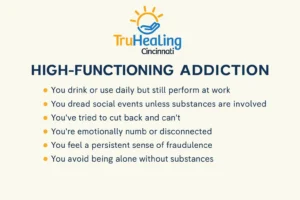You show up. You deliver. From the outside, everything works.
You’re the one people lean on, the one who never misses a deadline, the one who keeps it all together. But there’s another part—hidden, exhausted, and increasingly hard to ignore.
It starts with small things: skipping breakfast but not happy hour. Using sleep aids on weekdays. Drinking to decompress, then again to sleep. You think, It’s not that bad. I’m functioning. I’m fine. Until fine starts to feel like a lie.
This blog is for the ones who haven’t “fallen apart,” but feel like something underneath is crumbling. It’s about the invisible burnout behind high-functioning substance use—and how IOP (intensive outpatient programming) can offer clarity without requiring you to shatter your life.
When Functioning Becomes a Cover Story
It’s easy to dismiss your own symptoms when your performance doesn’t slip. The calendar’s full. You show up for your kids. You respond to emails. You make people laugh at work. You even hit your gym class—sometimes.
But when the quiet voice says, “This isn’t sustainable,” or “What happens if someone finds out?”—it’s not overreacting. It’s warning you.
High-functioning addiction is lonely. It thrives on secrecy and shame. And it convinces you that admitting there’s a problem means throwing away everything you’ve built. That fear can keep you trapped in high-achieving misery for years.
The Fear of Losing Identity in Treatment
One of the biggest reasons high-functioning professionals delay treatment is identity. You’ve built a life around achievement, image, and reliability. Asking for help feels like a betrayal of that identity.
There’s also a fear that treatment will flatten you—make you less sharp, less charismatic, less productive. What if sobriety dulls your edge? What if letting go of your coping mechanism means losing the very thing that helps you cope?
That’s why TruHealing Cincinnati’s IOP is designed with nuance. We don’t erase who you are. We help you get back to the version of you that doesn’t have to hide.
Why IOP Is the Right Fit for High-Functioning Professionals
Not everyone needs inpatient rehab. And for high-functioning individuals, inpatient can actually feel like too much, too soon. That’s where IOP comes in.
Here’s what makes IOP a smart fit:
- You keep your autonomy.
You attend several therapy sessions per week—but you still sleep in your own bed, go to work, and manage your day. - You get high-impact care.
Group therapy, individual counseling, relapse prevention, and holistic support are included. This is not surface-level work—it’s meaningful, structured change. - You’re surrounded by people like you.
Our IOP cohorts often include working professionals, parents, and people who are rebuilding—not starting over. - You don’t have to pretend.
You can say, “I’ve done well in life—and I’m still struggling,” without judgment. That truth lands safely here.
Looking for IOP in Lexington, Kentucky? We serve many clients from across Kentucky who want flexible treatment with high-impact results.
What Honesty Feels Like in a Room Like This
The scariest part of IOP for many isn’t the schedule. It’s the honesty.
What happens when you stop explaining, minimizing, or excusing? What happens when you sit in a room and say:
“I drink every night and still show up. But I’m scared of what happens if I stop.”
That kind of truth cracks something open—but it doesn’t break you. It becomes the doorway to actual support. And for many high-functioning adults, it’s the first time they realize: vulnerability doesn’t ruin you. It realigns you.
Identity After Substance Use: Who Am I Now?
For those whose self-worth has been intertwined with performance, letting go of substances can create an identity vacuum. You may ask:
- Who am I without the energy boost?
- Will I still connect with people socially?
- What happens if I lose my “edge”?
These questions are normal. And the answers don’t come all at once. But IOP gives you space to ask them safely, without rushing you into someone else’s definition of recovery.
At TruHealing Cincinnati, we don’t tell you who to become. We help you uncover who you’ve always been—beneath the habits, pressure, and masks.
What Clients Say After IOP
“I didn’t crash. I didn’t spiral. I just got tired of hiding how much I was using. IOP helped me be honest without burning my life down.”
– Client, 2024
“I thought treatment would make me less of who I was. Turns out, IOP gave me more access to the part of me I’d been numbing for years.”
– IOP Alumni, 2023
These are real stories from people who didn’t think they “needed” treatment—until they realized what life could feel like when they stopped carrying it all alone.
Signs You Might Need Help (Even If You’re “Functioning”)
You don’t have to wait for disaster. If any of this sounds familiar, it’s worth a conversation:
- You drink or use daily but still perform at work
- You dread social events unless substances are involved
- You’ve tried to cut back and can’t
- You’re emotionally numb or disconnected
- You feel a persistent sense of fraudulence
- You avoid being alone without substances
- You fantasize about escape—even just “turning it all off” for a bit
This doesn’t make you broken. It makes you human—and ready for a different way.
FAQs About IOP at TruHealing Cincinnati
How long does IOP last?
Our intensive outpatient program typically lasts 8–12 weeks, depending on individual needs. Some clients stay longer for additional support.
Can I keep working while in IOP?
Yes. IOP is built to work with your schedule. We offer day and evening groups so you can keep your job and responsibilities while getting help.
Is IOP only for addiction?
While many clients come to us for substance-related support, IOP also addresses mental health, trauma, anxiety, depression, and co-occurring challenges.
Do I have to share in groups?
You’ll never be forced to speak before you’re ready. But many clients find that sharing—even just a little—becomes a source of unexpected relief and connection.
What if I’m not sure I need treatment?
You don’t have to be sure to start asking questions. Many of our clients begin with an assessment, not a commitment. You can explore without pressure.
From “Keeping It Together” to Actually Feeling Whole
There’s a version of you that doesn’t have to micromanage perception, constantly perform, or pretend you’re okay just because things look okay.
That version isn’t gone—it’s just buried under pressure, fear, and the strategies you’ve used to cope.
IOP won’t erase who you are. It will help you show up as that person more clearly—with more self-respect, less panic, and the kind of honesty that makes relationships real again.
If you’re nearby but outside Cincinnati, we may still be able to help. Looking for IOP in Lawrenceburg, Kentucky? Our programs serve multiple communities across Ohio and Kentucky.
Ready to stop pretending and start feeling whole again?
Call (888) 643-9118 to learn more about our Intensive Outpatient Program services in Cincinnati, Ohio. We’re here when you’re ready.


